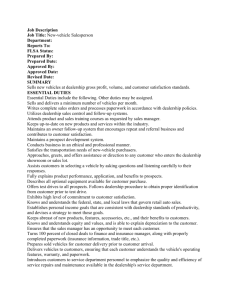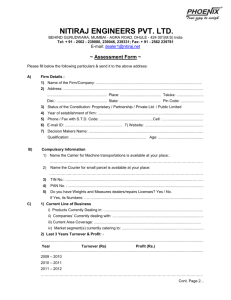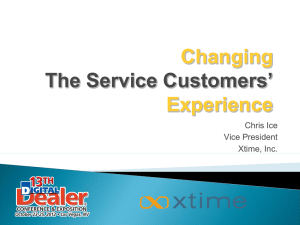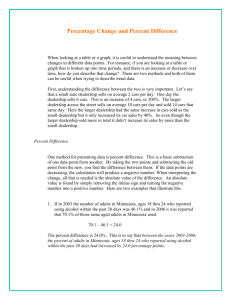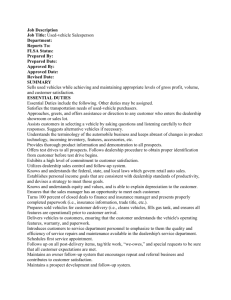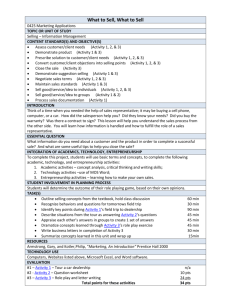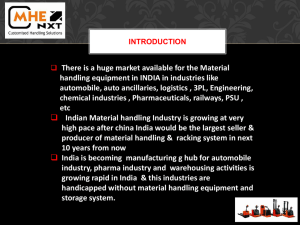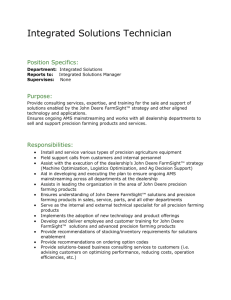Dealership Profitability Financial Metrics and Analysis
advertisement
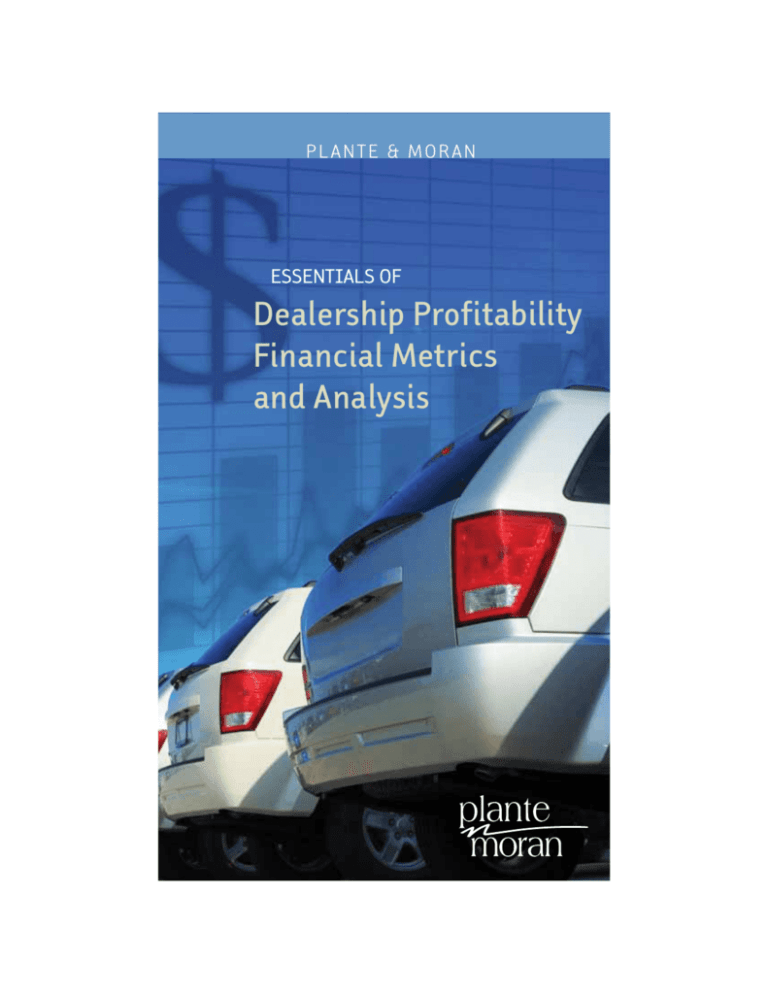
P L A NTE & M O R A N ESSENTIALS OF Dealership Profitability Financial Metrics and Analysis 6?B5G?B4 This profitability improvement work aid was designed by Plante & Moran’s auto dealership industry consultants to be used as a handy reference guide by dealers and their management teams. The work aid serves as a refresher on typical dealership cost structures and provides valuable insights with respect to the following topics: 7b_cc5]`\_iUU@b_TeSdYfYdi=UdbYSc 3_]`U^cQdY_^@b_R\U]1^Q\icYc 1TfUbdYcY^W5h`U^cU@b_R\U]1^Q\icYc 6\__b@\Q^9^dUbUcd5h`U^cU@b_R\U]1^Q\icYc 7UddY^WQ8Q^T\U_^4UQ\UbcXY`5h`U^cUc GQ\[Y^Wd_9]`b_fUT@b_VYdc 3_`Y^WGYdX=Q^QWU]U^d<UdXQbWi 5h`USdQdY_^c_V5VVUSdYfU@Qi@\Q^c 4Q^WUbcGXU^3XQ^WY^W@Qi@\Q^c @Qi@\Q^7_\TU^Be\Uc At Plante & Moran, we strive to assist our clients in being vigilant in the `b_dUSdY_^_VdXUYbTUQ\UbcXY`^Ud`b_VYdcQ^TbUdeb^_^Y^fUcd]U^dGXY\U the contents of this work aid are not revolutionary in nature, they serve as a good reminder to any reader of the “basics” involved in making money in the “car business” 9Vi_eXQfUQ^iaeUcdY_^cbUWQbTY^WdXUS_^dU^d_VdXYcg_b[QYT please do not hesitate to contact Jim Eagan at 248.223.3257 or jim.eagan@plantemoran.com. 1 451<5BC89@3?CDCDBE3DEB5B56B5C85B A worthy goal of any profit optimizing dealership would be to maintain a net profit level of 10 percent to 20 percent or higher of total dealership gross profit. To get there, dealership management needs to implement an appropriate cost structure based on the activity volumes in each department _VdXUTUQ\UbcXY`2U\_gQ^T_^dXU^Uhd`QWUQbUY\\ecdbQdY_^cY^R_dXdXU 3Xbic\UbQ^T6_bTVY^Q^SYQ\cdQdU]U^dV_b]QdcQ^TY^dXU7U^UbQ\=_d_bc format of cost structure relationships to total dealership gross, which will deliver the desired results. CHRYSLER AND FORD FINANCIAL STATEMENT FORMAT New Vehicle Used Vehicle Service Parts Body Shop Total Sales $$$$$$ $$$$$$ $$$$$$ $$$$$$ $$$$$$ $$$$$$ Cost of Sales ($$$$$) ($$$$$) ($$$$$) ($$$$$) ($$$$$) ($$$$$) 100% 100% 100% 100% 100% 100% (50%) (50%) (50%) (50%) (50%) (50%) 50% 50% 50% 50% 50% 50% Gross Profit Selling Expenses Selling Gross Fixed Expenses Operating Profit (Loss) Other Income (Expense) Net Income (Loss) 30% – 40% 10% – 20% – 10% – 20% Elements of Dealership Cost Structure (Chrysler and Ford): Cost of sales Selling expenses Sales commissions and salaries Advertising and promotion 6\__b`\Q^Y^dUbUcdUh`U^cU Training Predelivery Policy adjustments Fixed expenses Insight: Be cognizant of any non-arms-length amounts affecting rent, Y^dUbUcd`Qib_\\_b_dXUbUh`U^cUc 2 5\U]U^dc_V4UQ\UbcXY`3_cdCdbeSdebUS_^dY^eUT GENERAL MOTORS FINANCIAL STATEMENT FORMAT FIXED OVERHEAD New Vehicle Sales Cost of Sales Gross Profit Variable Selling Expenses Personnel Expenses Semi-Fixed Expenses Fixed Expenses Operating Profit (Loss) Net Additions (Deductions) Bonus Expenses Income Taxes Net Profit (Loss) Used Vehicle Lease and Rental Mechanical Body Shop Parts and Accessories Total $$$$$$ $$$$$$ $$$$$$ $$$$$$ $$$$$$ $$$$$$ $$$$$$ ($$$$$) ($$$$$) ($$$$$) ($$$$$) ($$$$$) ($$$$$) ($$$$$) 100% 100% 100% 100% 100% 100% 100% (19%–24%) (19%–24%) (9%–12%) N/A N/A N/A (10%–15%) (25%–35%) (25%–30%) (25%–30%) (45%–50%) (45%–50%) (45%–50%) (35%–45%) (25%–30%) (25%–30%) (25%–30%) (15%–20%) (15%–20%) (15%–20%) (20%–30%) (10%–15%) (10%–15%) (10%–15%) (15%–20%) (15%–20%) (15%–20%) (10%–20%) (10%–15%) 10%–15% 10%–15% 15%–20% 15%–20% 15%–20% 15%–20% 5%–10% $$$$ $$$$ 10%–20% Elements of Dealership Cost Structure (GM): Cost of sales Variable selling expenses Sales commissions and salaries 4U\YfUbi Policy adjustments Personnel expenses CQ\QbYUc°?g^Ubc=Q^QWUbcce`UbfYcY_^Q^TS\UbYSQ\ Other salaries and wages @Qib_\\dQhUc Employee benefits Retirement benefits Semi-fixed expenses 3_]`Q^ifUXYS\UUh`U^cU Supplies Advertising 3_^dbYRedY_^c 9^V_b]QdY_^dUSX^_\_WiQ^T_edcYTUcUbfYSUc Travel and entertainment 3 5\U]U^dc_V4UQ\UbcXY`3_cdCdbeSdebUS_^dY^eUT 4eUcQ^T`eR\YSQdY_^c Professional fees Telephone 6\__b`\Q^Y^dUbUcd Other interest ?dXUbUh`U^cUc Fixed expenses BU^dQ^TbUQ\UcdQdUdQhUc 4U`bUSYQdY_^Q^TQ]_bdYjQdY_^ Mortgage interest EdY\YdYUc 9^cebQ^SU_dXUb 5aeY`]U^dbU`QYbc 5aeY`]U^dbU^dQ\ Insight: Be cognizant of any non-arm’s-length amounts affecting rent, Y^dUbUcd`Qib_\\_b_dXUbUh`U^cUc 4 7 B ? C C 5 = @ <?I 5 5 @ B ? 4 E 3 D 9 F 9 D I = 5 DB 93 C GUXQfU_RcUbfUT_fUbdY]UQ]_^W_eb]_bU`b_VYdQR\US\YU^dcQ^TXQfUQ\c_ validated our hypothesis with two of the domestic big three manufacturers, that a well managed profit minded domestic dealership will generate $6,500 or higher of average gross profit per employee per month. This financial ]UdbYSYcg_bdXYdcgUYWXdY^R_dd_]\Y^UW_\T9VdXU^e]RUbYcd__\_g+Yd]Qi mean the dealership is giving up its gold. For any dealership, the average gross profit generated per employee, per month, is an extremely important profitability metric. If the average is low (less than $6,500 per month) this could be indicative of the dealership having too many employees. If the average is more than $6,500 per month, then the dealership’s head count is probably about where it should be for the gross being generated in the dealership. Computation (Direct Method): Step 1: 1fW4\b=dX\i7b_cc-ID44UQ\UbcXY`7b_cc÷ No. Months Step 2: 1fW7b_cc@Ub5]`@Ub=_^dX-1fW=dX\i7b_cc÷ No. Emps. Insights: 1. More profitable dealerships typically have an average gross profit per employee, per month, of close to $7,000 or higher. 2.E^V_bde^QdU\i]Q^iTUQ\UbcXY`cUh`UbYU^SUcYW^YVYSQ^d\i lower metrics. It is also possible to perform an indirect computation to arrive at a target number of employees, given the dealership gross levels. Computation (Indirect Method): Step 1: DQbWUd>__V5]`\_iUUc-1fW=dX\i7b_cc ÷ $6,500 Step 2: @_ccYR\U5hSUcc5]`\_iUUc-1SdeQ\8UQT3_e^d°DQbWUd No. of Employees 5 Gross/Employee Productivity Metrics (continued) Insights: Utilization of the indirect method can be very helpful in pointing out the extent of possible head count reductions that may be necessary. Indirect Method: Step 1: DQbWUd>__V5]`\_iUUc-1fW=dX\i7b_cc÷ $6,500 Step 2: @_ccYR\U5hSUcc5]`\_iUUc-1SdeQ\8UQT3_e^d°DQbWUd No. of Employees Goal: 3\_cU1\YW^]U^d_VDQbWUdQ^T1SdeQ\8UQT3_e^dc 6 Gross/Employee Productivity Metrics (continued) Examples: Assumptions D_dQ\4UQ\UbcXY`ID4Wb_cc-$ 6C-!"=_^dXc 4UQ\UbcXY`8UQT3_e^d-' Step 2: 1fW7b_cc@Ub5]`\_iUU@Ub=_^dX-1fW=dX\i7b_cc ÷ No. of Employees Direct Method: Step 1: 1fW4\b=dX\i7b_cc-ID44UQ\UbcXY`7b_cc÷ No. Months Step 1: ######$ ÷ !" Step 2: 1fW7b_cc@Ub5]`@Ub=_^dX-1fW=dX\i7b_cc÷ No. Emp. Step 2: $'&!######÷' Examples: Assumed facts: D_dQ\4UQ\UbcXY`ID47b_cc-$ 6C-!"=_^dXc 4UQ\UbcXY`8UQT3_e^d-' Step 2: 1fW7b_cc@Ub5]`\_iUU@Ub=_^dX-1fW=dX\i7b_cc ÷ No. of Employees 9^TYbUSd=UdX_T* Step 1: DQbWUd>__V5]`\_iUUc-1fW=dX\i7b_cc÷ $6,500 Step 1: %!######÷ &% Step 2: @_ccYR\U5hSUcc5]`\_iUUc-1SdeQ\8UQT°DQbWUd>__V5]` Step 2: !)' °%! 1^iQ^Q\icYc_VWb_ccU]`\_iUU`b_TeSdYfYdi]UdbYSc]ecdS_^cYTUbdXQdUfU^ with the right head count, if the compensation paid to these employees is too generous, given their performance and local market conditions, the dealership will not optimize it’s profit potential. 7 3? = @ 5 > C 1D9? > @ B ? 2 <5 = 1 > 1 <IC 9 C 9VdXUTUQ\UbYcdXU_^\i_^Unot smiling when paychecks are being handed out, chances are very likely that the dealership has a compensation problem. 3_]`U^cQdY_^`b_R\U]cS_]UY^]Q^icXQ`UcQ^TcYjUc1TUQ\UbcXY`]Qi have too many employees, overpaid employees for what they contribute, poor `UbV_b]Y^WU]`\_iUUc_bc_]U]YhdebU_VQ\\dXbUUC_bdY^WdXYc_edQ^T`UbYodically revalidating that what you think is optimal is highly recommended. To accomplish this we recommend the following: Review gross/employee productivity metrics Multiyear Departmental Form W-2 comparative analysis (E-mail jim.eagan@plantemoran.com for a complimentary analysis template spreadsheet) Complete a performance assessment of all employees: Rank employees in the same department by strength of performance on a scale from strongest to weakest. Then divide them into three tiers. Assign employees into the “Nice to Have” and “Must Have” categories Insight: Once the above information is assembled, it serves as a powerful motivating tool for adjusting employment cost. 8 1 4 F 5 BD 9 C 9 > 7 5 H @ 5 > C 5 @ B ? 2 <5= 1 > 1 <IC 9 C 4UQ\UbcXY`QTfUbdYcY^WUh`U^cUcQbU\QbWU\iRQcUT_^dXU`Ubc_^Q\`bUVUbU^SUc_V]Q^QWU]U^dGXY\U]_cdg_e\TS_^SUTUi_e^UUTQTfUbdYcY^WQd ceVVYSYU^d\UfU\cd_RbY^WY^dXUSecd_]UbdbQVVYSd_i_ebcd_bUUhSUccYfUQ^T ineffective advertising dollars being throw at problems in the hope that t XUigY\\W_QgQiYc_^U_VdXU]_cdVbUaeU^d\icUU^TbQY^c_^`b_VYdQRY\Ydi_V TUQ\UbcXY`cGXU^VQSUTgYdXfUXYS\UY^fU^d_bi_bTUbY^W]YcdQ[UcdXUcU Uh`U^cUcSQ^XUYWXdU^Y^dXUaeUcdd_bYTdXUTUQ\UbcXY`_Ve^gQ^dUT Y^fU^d_biGXU^dXYcXQ``U^cQcUbY_ecdXbUQdd_TUQ\UbcXY`^Ud`b_VYdc _SSebc9^dXUcUY^cdQ^SUcYdYcY]`_bdQ^dd_S_^cYTUbdXUV_\\_gY^WgYcT_]c* 50% Rule — 9dYccQYTdXQdXQ\V_VgXQdYcc`U^d_^QTfUbdYcY^WYcgQcdUT The difficulty is that it is hard to tell which half is the wasteful half. The Fishing Rule — 9VdXUVYcXQbU^µdRYdY^WgXigQcdUdXURQYd/ Advertising expense is frequently a big dollar category of cost which may or may not have direct linkage to gross generation. 9VQTUQ\UbcXY`Yc\_cY^W# `Ub]_^dXQ^Tc`U^Tc" `Ub ]_^dXY^QTfUbdYcY^Wi_e]ecdQc[i_ebcU\V²1bUdXUcUUh`U^cUcbUQ\\i ^USUccQbi/³ 9dYcdi`YSQ\\iUQcYUbV_bQTUQ\Ubd_bUTeSUQTfUbdYcY^WUh`U^cUcdXQ^ head count. Avoid the temptation to advertise your way out of inventory problems. You cannot spend advertising money that you don’t have. 9 6<? ?B@< 1>9>D5B5CD5H@5>C5@B?2<5=1>1<IC9C 6\__b`\Q^Y^dUbUcdUh`U^cUYc_^U_VdXU\QbWUcdS_]`_^U^dc_VQTUQ\UbcXY`µc costs and rises dramatically when vehicle inventories are not turning rapidly. 8_gT_i_e]Y^Y]YjUdXUReb^Vb_]V\__b`\Q^Y^dUbUcd/ It costs the dealer, on average, $200 per vehicle, per month, in interest expense for all vehicles more than 45 days old. 4UdUb]Y^UdXU]_^dX\iV\__b`\Q^Y^dUbUcdUh`U^cUV_bQWUTe^Ydc]_bU dXQ^$%TQicQ^TecUdXYcY^V_b]QdY_^d_TUdUb]Y^UQ^ic`USYQ\`bYSY^W_b in-store incentive and promotion programs to move these units. The floor `\Q^QccYcdQ^SUVe^TcbUSUYfUT_^dXUcUe^YdcQbUUhXQecdUTRi^_g Inventory ordering mistakes are commonly the cause of dealers having aged vehicle inventory problems. The number of individuals authorized to order inventory should be limited to responsible managers, and their pay plans should have features to penalize them for mistakes. Ideally, a dealership should carry an approximate 45- to 60-day supply of new vehicle inventory. 10 7 5 D D 9 > 7 1 8 1 > 4 <5 ? > 4 5 1 <5 B C 8 9 @ 5 H @ 5 > C 5 C A dealer should be well aware of what types and amounts are being spent for dealership purchases. Preferably, purchases should be controlled at least at the department manager level and, optimally, centralized with one person. Profit-minded dealers carefully analyze all dealership purchases and place their annual costs on a “Nice to Have” or “Must Have” list. Dealership data processing reports can print off every expense category. It is recommended that a dealer have these printouts reviewed by managers with the goal of having them identify “Nice to Haves” versus “Must Have” items. After this manager review, the dealer should make the final determination. A good way to get a handle on departmental purchases is to have a departmental mangers’ check signing party Some dealers each week bring into a room, all departmental managers and quiz them as the dealer signs vendor checks. A strong message is conveyed to the managers to think twice before spending because they may be in the hot seat at the next party. 11 G1 <; 9 > 7 D? 9 = @ B ? F 5 4 @ B ? 6 9 DC It is fairly easy to prepare on a pro forma basis what the financial results of a dealership will be if no changes are made to a dealership’s cost structure during economically challenging times. (E-mail jim.eagan@plantemoran.com for a complimentary analysis template spreadsheet) Once the above pro forma is prepared, it is very beneficial to consider various alternative cost-reduction strategies, the source of which should be apparent from the profitability analysis performed with respect to: Employment costs (head count, pay plans, fringes) Advertising expenses Floor plan expenses “Nice to Have” versus “Must Have” expense analysis Frequently, there is no one way of walking to improved profits. The specific strategies are ultimately up to each individual dealer. 12 3? @ 9 > 7 G 9 D8 = 1 > 1 7 5 = 5 >D <5 D8 1 B 7I 9^Q\]_cdQ\\SQcUci_e^UUTd_RU`bU`QbUTV_bTU`Qbd]U^dQ\]Q^QWUb resistance to change. The degree of this resistance may or may not have any bearing on how desperate the financial condition of the dealership is. 9VdXUTUQ\UbcXY`Yc\_cY^W]_^UiQ^TReb^Y^WdXb_eWXYdcUaeYdiYdYc worthwhile for a dealer to estimate how many months are left, assuming dXUSebbU^d\_ccbQdURUV_bUdXUTUQ\UbcXY`U\Y]Y^QdUcYdcUaeYdi1\dX_eWX possibly very sobering, doing these types of computations is highly motivating to act before it becomes too late. @beTU^dTUQ\UbcgY\\bUS_W^YjUX_gebWU^dYdYcd_dQ[UQSdY_^4UQ\UbcgX_ are deficient in their business skills are the ones who will tend to be frozen, delay, or not implement changes. Sometimes dealers just need someone to give them permission to make the changes that are necessary. As strange as it may seem, we have even had TUQ\UbcdU\\ecdXYcGUU^S_ebQWUQ\\TUQ\Ubcd_T_gXQddXUYbRecY^Ucc instincts tell them to do. That little voice in your head is all the permission dXQdi_e^UUT9Vi_eQbUcdY\\e^cebU_VgXQdd_T_gUU^S_ebQWUi_ed_ please contact one of Plante & Moran’s auto dealership industry consultants. GUSQ^RUQfUbiRU^UVYSYQ\c_e^TY^WR_QbT 13 5H@53D1D9?>C?656653D9F5@1I@< 1>C Effective pay plans may: Cause an individual to be highly motivated to perform tasks that, if done right, will enhance his or her own financial success and that of the entire dealership. Result in a fair overall compensation paid to the individual based on their economic worth in the marketplace. Do not reward those who are riding the wake of others. Incorporate specific performance expectations and reward their achievement and/or penalize the lack thereof. Reward an individual fairly for what you want them to accomplish, not necessarily based on what they say they need. Reflect your overall management philosophy. Be understood by all parties and documented in personnel files. Be reviewed at least annually for effectiveness; this review should consider both individual and dealership performance expectations and results. Too often dealers changing their pay plans act impulsively, sometimes out of TUc`UbQdY_^Q^TU^Te`]Q[Y^WQRQTcYdeQdY_^g_bcU8_gUfUbTUQ\UbcgX_ think things through, perform competitive market analysis, and perform pro forma analysis of the “what ifs” usually have great results. 14 @1I@< 1>7?<45>BE<5C Keep it simple and, if you can avoid it, don’t change pay plans frequently. (We’ve witnessed many examples where complex and ever-changing pay plans lead to low employee morale and motivation, higher turnover, and cheating.) The pay plans must deliver a dealership compensation cost structure which, when applied to departmental gross profit levels, leaves a reasonable and satisfactory net profit and return on investment levels for the dealership owners. 15 B 5 D1 9 < 4 5 1 <5 B = 5 > E ? 6 C 5 B F 93 5 C STATEGIC, FINANCIAL & BUSINESS PLANNING TAX & FINANCIAL SERVICES Financial Statement Services Tax Filing Compliance & Accounting Support Estate Planning Investment/Portfolio Analysis LIFO Inventory Computations Strategic & Business Planning Income Tax Reduction & Preparation Retirement Planning Life Insurance Analysis Cost Segregation Studies & Tax Depreciation Planning Acquisition and Sale Assistance Forensic Accounting & Fraud Investigation Business Succession Planning Global Services Accounting & Internal Control Design Forecasting & “What If” Anaysis Profitability Improvement Financial Metric Analysis Pay Plan Optimization Analysis Retail Dealer Clients CORPORATE REAL ESTATE HUMAN CAPITAL MANAGEMENT & DEVELOPMENT TECHNOLOGY CONSULTING & SOLUTIONS Information Systems Selection and Implementation System Security Reviews Hardware Analysis SAS 70 Reviews Web Presence & Strategy LANs/WANs Employee Benefits Cost Savings Analysis Compensation Analysis Deferred Compensation Plan Strategies Personnel Testing 401(k) Performance Analysis/Consulting 16 Lease Negotiation Purchase Analysis & Advising Lease vs. Buy Consultation LOCATIONS ILLINOIS Chicago 312.899.4460 Elgin 847. 697.6161 MICHIGAN Ann Arbor 734.665.9494 Auburn Hills 248.375.7100 Detroit 313.876.1630 East Lansing 517.332.6200 Flint 810.767.5350 Grand Rapids 616.774.8221 Kalamazoo 269.567.4500 Macomb 586.416.4900 St. Joseph/Benton Harbor 269.982.8000 C_edXVYU\T5QcdGUcd 248.352.2500 Traverse City 231.947.7800 OHIO Cincinnati 513.595.8800 Cleveland 216.523.1010 Columbus 614.849.3000 Toledo 419.843.6000 CHINA Shanghai 8621.52131026 INDIA Mumbai 91.22.3953.7247 MEXICO Monterrey 52.81.1477.5151 VISIT plantemoran.com 18
